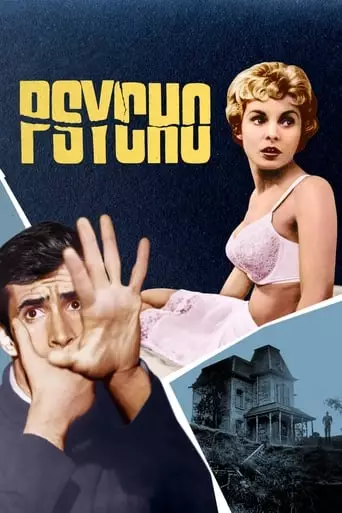
Psycho (1960) Watch Online Free
When larcenous real estate clerk Marion Crane goes on the lam with a wad of cash and hopes of starting a new life, she ends up at the notorious Bates Motel, where manager Norman Bates cares for his housebound mother.
Plot Summary:
Alfred Hitchcock’s Psycho is a groundbreaking psychological thriller that continues to influence the horror and suspense genres. The film follows Marion Crane (played by Janet Leigh), a secretary who steals a large sum of money and flees town. Her escape leads her to the isolated Bates Motel, where she meets its peculiar owner, Norman Bates (Anthony Perkins). What follows is a chilling tale of deception, madness, and death that forever altered the trajectory of horror filmmaking.
Marion’s arrival at Bates Motel introduces the enigmatic and unsettling Norman, who lives with his domineering mother, Norma. As the narrative unfolds, Hitchcock skillfully manipulates audience expectations, especially through his infamous “shower scene,” which marks a pivotal turning point in the plot. The film’s climax reveals shocking truths about Norman’s split personality, his mother, and his involvement in a series of murders. The film’s disturbing themes of voyeurism, identity, and the dark side of human nature are explored with a keen psychological depth that was unprecedented in 1960.
Analysis:
Hitchcock’s genius lies in his ability to subvert expectations and manipulate tension. From the very beginning, the film plays with audience assumptions, shifting from a crime thriller to a horrifying psychological exploration. The tension is palpable throughout, building with each new revelation. The famous shower scene, often considered one of the most shocking moments in cinematic history, was revolutionary in its execution, not just for its violence but for its impact on the horror genre.
The film also explores themes of identity and duality. Norman Bates is a character whose surface innocence masks his deeper, more sinister nature. His relationship with his mother, presented as a psychological trap, serves as the film’s primary psychological conflict, with Norman’s troubled past and split personality slowly revealed.
The cinematography and soundtrack, composed by Bernard Herrmann, further elevate the atmosphere of dread. Hitchcock’s innovative camera techniques and use of sound (particularly the high-pitched strings during moments of terror) create an unforgettable sensory experience.
10 Reasons to Watch Psycho:
How You Will Feel After Watching Psycho:
After watching Psycho, you are likely to feel a mixture of unease, shock, and fascination. The film’s abrupt shifts in narrative and its psychological complexity leave a lasting impression, and you may find yourself reflecting on the themes of identity and madness long after the credits roll. The sense of dread that Hitchcock cultivates is unforgettable, and the film’s iconic moments, particularly the shower scene, are sure to stick with you. While Psycho may leave you feeling disturbed or unsettled, it will also provoke thought about human nature and the darkness that lies beneath the surface.
Whether you are a seasoned horror fan or new to the genre, Psycho offers a cinematic experience that is both intellectually stimulating and deeply unsettling
